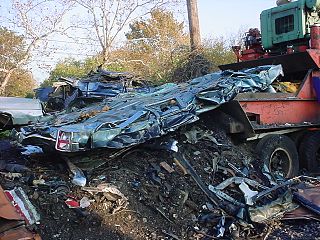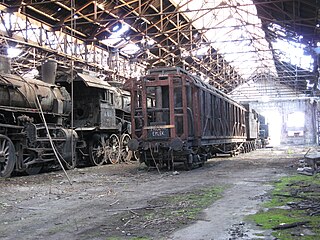 W
WVehicle recycling is the dismantling of vehicles for spare parts. At the end of their useful life, vehicles have value as a source of spare parts and this has created a vehicle dismantling industry. The industry has various names for its business outlets including wrecking yard, auto dismantling yard, car spare parts supplier, and recently, auto or vehicle recycling. Vehicle recycling has always occurred to some degree but in recent years manufacturers have become involved in the process. A car crusher is often used to reduce the size of the scrapped vehicle for transportation to a steel mill.
 W
WAutomotive oil recycling involves the recycling of used oils and the creation of new products from the recycled oils, and includes the recycling of motor oil and hydraulic oil. Oil recycling also benefits the environment: increased opportunities for consumers to recycle oil lessens the likelihood of used oil being dumped on lands and in waterways. For example, one gallon of motor oil dumped into waterways has the potential to pollute one million gallons of water.
 W
WThe shredding of automobiles and major household appliances is a process where a hammermill acts as a giant tree chipper by grinding the materials fed into it to fist-size pieces. The shredding of automobiles results in a mixture of ferrous metal, non-ferrous metal and shredder waste, called automotive shredder residue or automobile shredder residue (ASR). ASR consists of glass, fiber, rubber, automobile liquids, plastics and dirt. ASR is sometimes differentiated into shredder light fraction and dust. Sometimes these residual materials are called "car-fluff".
 W
WA blasting mat is a mat usually made of sliced-up rubber tires bound together with ropes, cables or chains. They are used during rock blasting to contain the blast, prevent flying rocks and suppress dust.
 W
WA car crusher is an industrial device used to reduce the dimensions of derelict (depreciated) cars prior to transport for recycling.
 W
WNational Metal and Steel Corporation was engaged in ship dismantling operations at Terminal Island in the Los Angeles Harbor Region of the city of Los Angeles, California.
 W
WShip-breaking is a type of ship disposal involving the breaking up of ships for either a source of parts, which can be sold for re-use, or for the extraction of raw materials, chiefly scrap. Modern ships have a lifespan of 25 to 30 years before corrosion, metal fatigue and a lack of parts render them uneconomical to operate. Ship-breaking allows the materials from the ship, especially steel, to be recycled and made into new products. This lowers the demand for mined iron ore and reduces energy use in the steelmaking process. Fixtures and other equipment on board the vessels can also be reused. While ship-breaking is sustainable, there are concerns about the use by poorer countries without stringent environmental legislation. It is also labour-intensive, and considered one of the world's most dangerous industries.
 W
WTire recycling, or rubber recycling, is the process of recycling waste tires that are no longer suitable for use on vehicles due to wear or irreparable damage. These tires are a challenging source of waste, due to the large volume produced, the durability of the tires, and the components in the tire that are ecologically problematic.
 W
WTire recycling in the United States is the disposal and reuse of waste tires.
 W
WA train graveyard is where trains and rolling stock are discarded while awaiting collection, recycling, or destruction. They might be abandoned and left to decay. The term can also be used to include trams. Such vehicle graveyards are distinguished from an abandoned railway, which is a railway line that is no longer used for that purpose, and abandoned railway stations which are similarly disused. Some train graveyards attract visitors and can be a source of tourism, while others have had a role in preserving the history of the railways.
 W
WA wrecking yard, scrapyard or junkyard is the location of a business in dismantling where wrecked or decommissioned vehicles are brought, their usable parts are sold for use in operating vehicles, while the unusable metal parts, known as scrap metal parts, are sold to metal-recycling companies. Other terms include wreck yard, wrecker's yard, salvage yard, breaker's yard, dismantler and scrapheap. In the United Kingdom, car salvage yards are known as car breakers, while motorcycle salvage yards are known as bike breakers. In Australia, they are often referred to as 'Wreckers'.